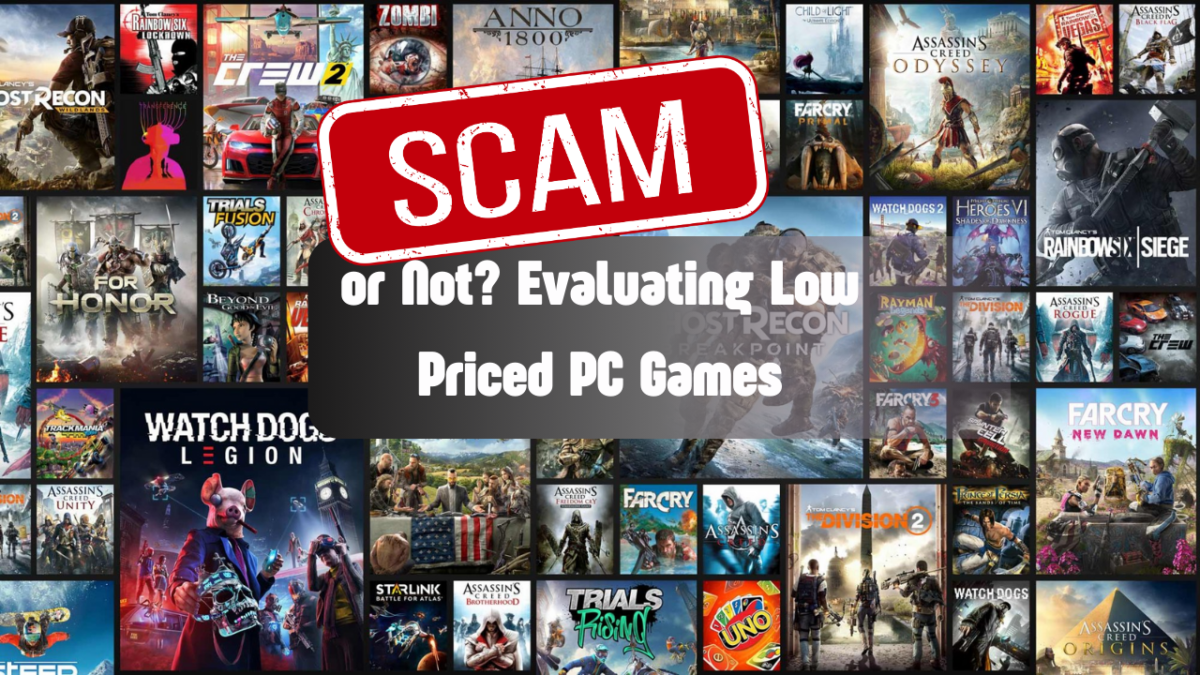In the world of PC gaming, finding a great deal on a popular title can feel like hitting the jackpot. However, deals that seem too good to be true often raise concerns about their legitimacy. This article explores the findings from a recent YouTube video that investigated whether low-priced PC games from less-known sources are genuine or scams. Read more such articles on Gamingepicenter.com
Table of Contents
ToggleScam or Not? Evaluating Low Priced PC Games
Evaluating low-priced PC games can be a daunting task, especially with the rise of scams and fraudulent listings in the gaming market. With prices dropping significantly, players often wonder whether these deals are genuine or if they are merely bait for scams. This article will explore the landscape of low-priced PC games, helping you discern between legitimate offers and potential scams.
Understanding the Appeal of Low-Priced PC Games
The Rise of Affordable Gaming
In recent years, the gaming industry has seen a surge in affordable titles, especially on platforms like Steam, Epic Games Store, and others. Sales events, bundles, and indie game releases have made it possible for gamers to build extensive libraries without breaking the bank.
Why Are Games So Cheap?
Several factors contribute to the low prices of PC games:
-
Indie Development: Many indie developers create games with smaller budgets, allowing them to price their products lower.
-
Sales and Discounts: Major platforms frequently offer sales, allowing gamers to purchase titles at a fraction of the original price.
-
Competition: With numerous platforms and developers, competition drives prices down as companies strive to attract customers.
While these factors make gaming more accessible, they also raise questions about the quality and legitimacy of some titles.
Initial Skepticism
The host of the video begins with a healthy dose of skepticism, showcasing the surprisingly low prices of well-known PC games such as Marvel Spider-Man Remastered, God of War, and Elden Ring. These games were listed at prices significantly lower than their official retail prices, prompting questions about their authenticity and potential risks.
Testing the Games
To determine the legitimacy of these deals, the host decides to test the low-priced Steam games. The process includes following specific instructions, such as activating an offline mode option to play the games. This step is crucial to avoid any potential online checks that might invalidate the game’s authenticity.
Reasons for Purchasing Low-Priced Games

The host provides several reasons why one might choose to purchase these low-priced games rather than downloading pirated versions:
Vulnerability Check: Legal copies are safer and less likely to contain malware or other security vulnerabilities.
Easy Installation and Updates: Official versions offer seamless installation and easy access to updates, ensuring the game runs smoothly.
Cheap Price: Despite the low cost, these games are advertised as 100% genuine with lifelong access.
Results of the Test
Upon testing, the host confirms that the games purchased at low prices are indeed genuine. The installation process was smooth, and the games functioned as expected without any issues. This finding suggests that not all deals that seem too good to be true are necessarily scams.
Caution Advised
While the tested games proved to be genuine, the host advises viewers to proceed with caution. It is essential to conduct thorough research before purchasing games from less-known sources. Avoiding cracked versions and ensuring the source’s legitimacy can help prevent security risks and ensure a reliable gaming experience.
Identifying Potential Scams
The Problem of Fake Games
One of the most significant issues in the low-priced game market is the presence of fake or fraudulent games. These games often mimic popular titles, using similar names, artwork, and descriptions to deceive buyers.
Recent Incidents
For instance, a wave of fake games appeared on Steam, including fraudulent listings for popular titles like “Helldivers 2.” These listings were heavily discounted, enticing players to make purchases without realizing they were buying a scam. Some buyers ended up with subpar games or even malicious software instead of the expected title.
Red Flags to Watch For
When evaluating low-priced games, keep an eye out for the following red flags:
Unrealistic Pricing: If a game is significantly cheaper than similar titles, it might be too good to be true.
Lack of Information: Legitimate games typically have detailed descriptions, trailers, and reviews. If a listing lacks this information, proceed with caution.
Poor Reviews: Check user reviews. If a game has many negative reviews or a suspiciously high number of positive reviews that seem generic, it could be a scam.
Publisher Reputation: Research the developer or publisher. Established companies are generally more trustworthy than unknown entities.
Evaluating Legitimate Low-Priced Games
Researching the Game
Before making a purchase, conduct thorough research:
Check Reviews: Look for reviews on multiple platforms. Websites like Metacritic or Steam can provide insights into the game’s quality.
Watch Gameplay Videos: Platforms like YouTube often have gameplay videos that can help you gauge whether a game meets your expectations.
Engage with the Community: Forums and social media groups dedicated to gaming can provide valuable information and warnings about specific titles.
Utilizing Refund Policies
Many platforms, such as Steam, offer refund policies that protect buyers. If you purchase a game and find it unsatisfactory or fraudulent, you can request a refund within a specific timeframe, usually two weeks, as long as you have played for less than two hours. This policy provides a safety net for cautious buyers.
The Role of Third-Party Sellers
Buying from Authorized Retailers
While platforms like Steam are popular, many gamers also turn to third-party sellers for discounts. However, not all sellers are trustworthy.
Researching Third-Party Sellers
When considering a third-party seller, follow these steps:
Check Reviews: Look for customer reviews on platforms like Trustpilot. A seller with a high rating and positive feedback is generally more reliable
Verify Legitimacy: Ensure the seller is authorized to distribute the games. Websites like IsThereAnyDeal.com can help you find reputable sellers.
Be Cautious of Deals That Seem Too Good to Be True: If a deal appears significantly cheaper than on official platforms, it may be a scam.
The Risks of Grey Market Keys
Grey market keys are often sold at reduced prices but can come with risks. These keys may be obtained through questionable means, leading to potential bans from platforms like Steam. Always exercise caution and consider the long-term implications of purchasing from grey market sellers.
Protecting Yourself from Scams
Best Practices for Safe Purchases
To ensure a safe purchasing experience, follow these best practices:
Do Your Homework: Research games, developers, and sellers before making a purchase.
Use Secure Payment Methods: Always use secure payment options, such as credit cards or PayPal, which offer buyer protection.
Stay Informed: Keep up with gaming news and community discussions to stay aware of potential scams and fraudulent listings.
Reporting Scams
If you encounter a scam or fraudulent game, report it to the platform where you found it. This helps protect other gamers from falling victim to similar scams.
Scam or Not? Evaluating Low Priced PC Games Conclusion
In conclusion, the video demonstrates that some low-priced PC games from less-known sources can be genuine. However, caution and due diligence are crucial when exploring these deals. Supporting legitimate game purchases ensures safety, reliability, and the continued development of high-quality games.
Always research thoroughly and prioritize purchasing from reputable sources. If you enjoyed this article, don’t forget to like, share, and stay tuned for more insightful content on PC gaming and other tech topics.
Scam or Not? Evaluating Low Priced PC Games FAQS
1. How can I tell if a low-priced game is legitimate?
Look for detailed descriptions, gameplay videos, and user reviews. Research the developer and check for any red flags, such as unrealistic pricing.
2. What should I do if I purchase a scam game?
If you realize you’ve purchased a scam game, request a refund through the platform’s refund policy. Additionally, report the scam to help protect other gamers.
3. Are third-party sellers safe for buying games?
Not all third-party sellers are trustworthy. Research sellers thoroughly, check reviews, and ensure they are authorized distributors before making a purchase.
4. What are grey market keys, and should I buy them?
Grey market keys are often sold at discounted prices but can come with risks, including potential bans from platforms. Exercise caution and consider the long-term implications before purchasing.
5. How can I protect myself from scams when buying games?
Do your homework, use secure payment methods, and stay informed about potential scams and fraudulent listings in the gaming community.
